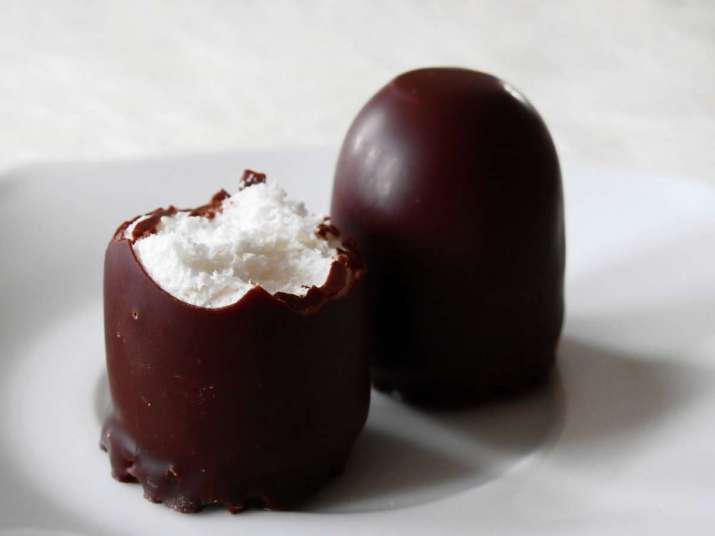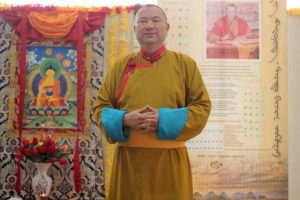There’s this famous Stanford marshmallow experiment in behavioral psychology in which a group of toddlers had to choose between short-term gratification and long-term reward. They were left in a room alone and told that they could either eat a marshmallow now or wait for 15 minutes to receive two marshmallows. The little ones who were able to postpone gratification went on to do better in many areas of life as adults.
During my childhood in Germany we didn’t have marshmallows, but we did have something known at the time as a “Negerkuss” (lit. negro kiss), a treat similar to the Tunnock’s Teacakes sold here in Scotland. Heavenly sweet egg-white fluffiness heaped on a waffle bed and contained within a perfect dome of dark chocolate; the architecture of it was as thrilling as the name (which has since been abandoned in favor of the less offensive “Schokokuss,” or chocolate kiss) and its sensuous potential. You would shape the tongue into a lance to pierce through the bitter-sweet leaf-thin first layer, withdraw to consider the break pattern, flick off some of the chocolate splinters with the tip of the tongue, and then scoop up the airy body to melt into gooey satisfaction against the roof of the mouth. The licked-clean, crisscross-textured round waffle was then savored with as many little crunchy bites as possible.

If I had been one of the children in the Stanford marshmallow experiment, presented with the choice of immediate pleasure or more of it in the future, what would I have done I wonder? If my current life choices provide a clue, I think I would have relished the marshmallow there and then. I wouldn’t necessarily have bought into the assumption that two marshmallows are an improvement on one. The accumulation of wealth for future material security and status has never been a compelling vision for me. I’d rather be rich in time now than work a 9–5 job that compromises my core values in order to chase a substantial pension in a future that may not actually come to be. However, if the offered choice had been between the marshmallow now and satisfaction of a different order later, say, quality time with an adored adult, I may well have resisted the temptation.
I spend a lot of my time on pursuits that can be called “practice,” be it meditation, yoga, or playing the piano. They could be seen as states of postponed satisfaction, since the very notion of practice implies greater skills or a sense of accomplishment at a later stage. What really excites me, however, is finding that inner switch to enjoying the present moment at any stage of the process. When I remember the possibility of presence while practicing that fast right-hand run in the Beethoven’s “Spring Sonata” for violin and piano, at different speeds and in a variety of rhythms, it can yield as much satisfaction there and then as eventually playing it with Dan, my violinist friend. In meditation there is also an element of skill development: training the mind in sustained attention on the breath, for example. What really defines the art of meditation, however, is this insight that can gradually pervade all aspects of the meditator’s life: there is only this moment and it holds everything you desire. Relax into it. Both are true: something needs to be developed, and it is also already present. Two Buddhist images convey these two approaches: the spiritual life as the gradual ascent of a mountain toward the glacier-bright goal of the mountain top in the far distance, and the opening of a lotus flower revealing its purity and glory.
In any case, being present is a key skill or attitude—whether the occasional, guilt-free savoring of a Schokokuss; the more mental and subtle enjoyment of writing about it, or simply hanging out doing nothing, just treasuring a quality of consciousness directly.
Having just moved house, we are living in a chaos of boxes, stacked picture frames, rolled up carpets, and other random items. I am reminded of a badly organized charity shop. It will take a while to get settled and sorted; the curtain rail keeps falling down and we don’t know how the underfloor heating works. I had to lead an online weekend retreat the day after we moved in (the move had been scheduled for several weeks earlier). Thinking about how to create efficient storage space and letting go into spacious awareness could seem like very different ways of using a human brain. I needed to trust that it would come together, without much preparation, by surrendering to moment to moment; “heartful” living. The title of Jon Kabat Zinn’s famous book Full Catastrophe Living comes to mind. Here is a quote from it to leave you with:
Meditation is not so concerned with how much thinking is going on as it is with how much room you are making for it to take place within the field of your awareness from one moment to the next.
See more
Living Mindfulness
Holy Isle Centre For World Peace And Health












